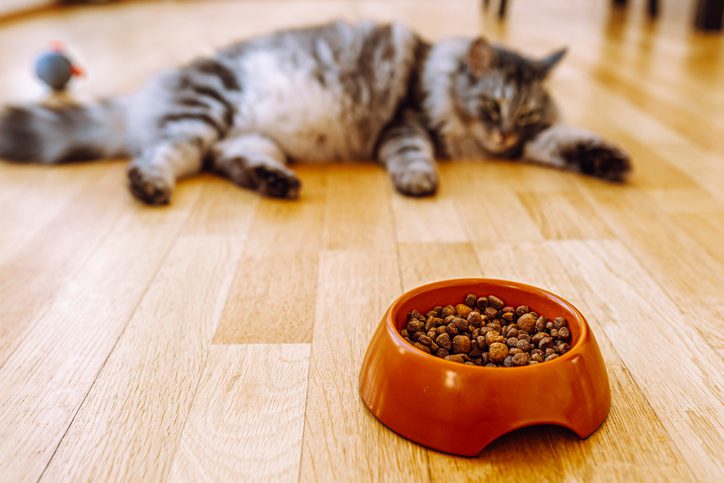Why is My Cat Not Eating?
A healthy cat will typically have a healthy appetite. That said, if you notice that your feline (that is usually not finicky or known to regularly skip meals) is uninterested in its food, you should take it to a veterinarian in Livonia, MI as it can be a sign of an underlying disease.

Common Reasons Why Your Cat Isn’t Eating
Listed below potential reasons why your cat isn’t eating along with treatment methods:
Kidney Disease
Cats with chronic kidney disease (CKD) will likely experience a buildup of waste products and other compounds in the bloodstream that are normally regulated or removed by its kidneys. It is common for cats with CKD to lose weight due to a lack of appetite.
Treatment
A vet will treat CKD with intravenous fluids to correct dehydration, supplements, medications, vitamin injections, or potential surgery to remove blockages. The goal of treatment is slowing the progress of CKD and managing its symptoms.
Pancreatitis
The exact cause of feline pancreatitis is unknown, but it’s associated with cats ingesting poison, contracting parasitic infections, or experiencing trauma like getting hit by a car. This disease often makes cats nauseous, which is one of the reasons why affected animals aren’t typically very hungry.
Treatment
Successful treatment depends on early diagnosis and prompt medical therapy. Cats with mild pancreatitis will be treated with supportive care, such as IV fluids, pain and anti-nausea medication (like maropitant [Cerenia]), and treatment for the underlying cause. As already stated, the earlier the disease is detected, the better. Cases that are addressed and treated in the initial stages will have a higher chance of resolving without further complications.
Cancer
Like humans, exposure to tobacco smoke, asbestos, prolonged sunlight, and lack of exercise have often been linked to an increased risk in cats developing cancer.
Treatment
Chemotherapy is often used to treat feline cancer. Although cancer cells are the intended target, the cells that line the stomach and intestines are also rapidly dividing and can be affected. The result of this is commonly nausea, vomiting, and diarrhea, all of which can decrease a cat’s appetite.
Dental disease
There are three dental diseases that commonly occur in cats: gingivitis, periodontitis, and tooth resorption. All of these can cause pain and can hinder your cat’s ability or desire to eat food.
Treatment
Treatment of dental disease in cats will often involve removing plaque and mineral buildup by scaling and polishing the teeth. It is always the goal to save teeth, if possible, but in more severe cases, extraction of teeth is sometimes required.
Ingestion of Non-Food Material
Pica is a condition that causes cats to eat non-food items, like fabrics, paper, rubber, plants, or soil. It can be caused by several factors, such as a nutritional deficiency and anxiety. Accidental ingestion of non-food materials can also occur. Cats who have an intestinal blockage or who fill their stomachs with non-food items may not want to eat their food.
Treatment
If you believe your cat has ingested something it shouldn’t have, you should take it to your veterinarian. You should also consider providing your pet with environmental enrichment (like giving it a fun or restful outdoor time with a “catio,” hiding treats around the house for it to “hunt,” picking safe chew toys, and using cat grass as a safe alternative to non-food materials, being extra careful to pick up objects that your cat shouldn’t be eating, and playing with your cat on a more frequent basis). If none of your efforts work, you may also consider consulting an animal behaviorist.
Urinary tract infection
Cats, particularly those who are overweight, middle-aged, eat exclusively dry food, or don’t get enough physical activity (although cats of any age can be affected), are at a higher risk of getting a urinary tract infection (UTI). Cats with UTIs can demonstrate several symptoms, including straining to urinate, reduced amounts of urinating, not urinating at all, increased frequency of urination (especially around the house or outside of the litter box), pain or discomfort when passing urine, and passing urine tinged with blood. A lack in appetite, along with lethargy/hiding, abdominal pain, labored breathing, and other changes in behavior, can be a common side effects of a UTI.
Treatment
Antibiotics are often given to cats with UTIs, however, pain medications may also be required (because UTIs can be very painful and uncomfortable). Diet changes may also be recommended.
Arthritis
Osteoarthritis (OA) is a condition that involves inflammation and degeneration of one or more joints. For that reason, it is sometimes also referred to as degenerative joint disease. OA causes a cat to experience stiffness, pain, swelling, lameness, reluctance to move around, and sensitivity to being touched in certain parts of its body. Clinical signs include loss of appetite.
Owners of cats diagnosed with arthritis should make sure that there are plenty of food and water bowls on each level of their homes, so that the animal always has access to nutrients without needing to walk too far or go up or down stairs.
Treatment
Non-steroid anti-inflammatory drugs (NSAIDs), pain management medications, injectable joint protectants, acupuncture, and cold laser therapy or photobiomodulation (PBMT) may also be used to treat OA in cats.
Psychological Issues
Psychological issues can also alter a cat’s appetite. Stressors like a recent move and the addition of a new child or animal are common aggravating environmental changes that impact cats. Such stress can cause a cat to be discouraged from eating.
Treatment
If you are going through an impactful environmental change, you should stick to some kind of routine with your cat, play with it and shower your love on it, enhance the number of meals you’re offering, or turn on music or the TV while you and your family are gone. Like the behavioral issues associated with pica, you can always consult an animal behavior specialist to address issues if they persist.
We are Here to Help if Your Cat Isn’t Eating in Livonia, MI
Sudden changes in a cat that is otherwise known for being a good and regular eater could be associated with several medical and mental conditions that you should quickly address with a veterinarian. Levan Road Veterinary Hospital is here to help if your cat isn’t eating. Schedule a vet visit with us by giving us a call at (734) 464-6281.

